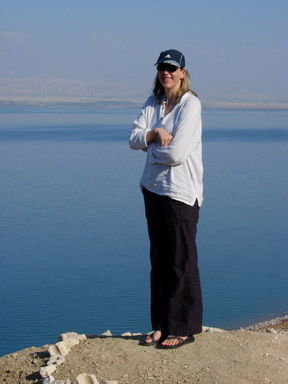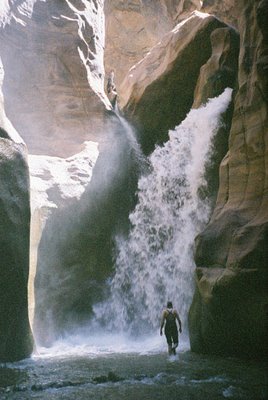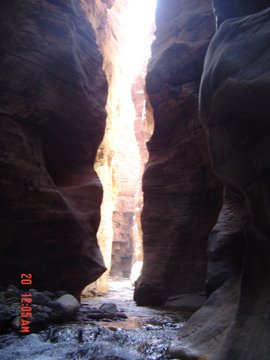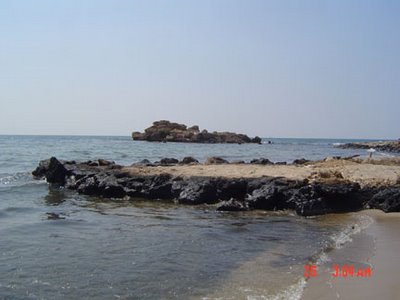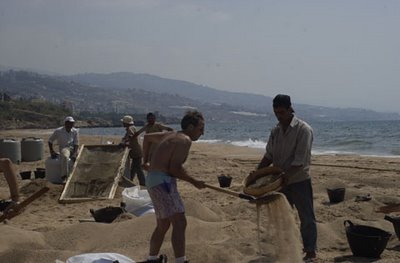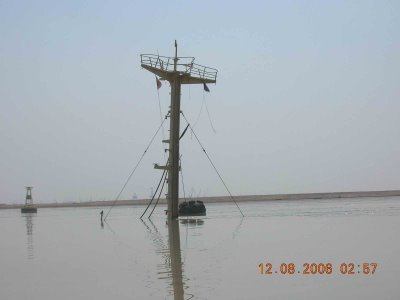I haven't included an update from the Hebron Team in quite awhile. Honestly, I open their emails with some trepidation these days. I've noted a marked increase in the hostility and violence that they are seeing there. It is quite frightening and seems more and more on the verge of a major eruption every day. What is particularly hard to bare is the way that children on both sides are being indoctrinated into a culture of hate.
Christian Peacemaker Teams is an ecumenical initiative to support violence reduction efforts around the world. To learn more about CPT's peacemaking work, please visit our website at: http://www.cpt. org. Photos of our projects may be viewed at: http://www.cpt. org/gallery.Hebron Update: 8-14 October 2006 - On team during this period: Jan Benvie, Donna Hicks, Barbara Martens, Abigail Ozanne, Kathie Uhler, Jerry Levin.
Sunday 8 October 2006 - The Ibrahimi Mosque was closed by the Israeli army in anticipation of the large crowds of Jews expected to crowd into the area. They came for observances and celebrations in connection with the ongoing Succoth event which began Saturday. Barbara Martens and Abigail Ozanne on early morning patrol encountered two soldiers in Shuhada Street. One smilingly said he wanted Ozanne's CPT cap. To get it, Ozanne said, he would have to quit the army. But he said they needed them. Then the other soldier said, "This is what I do! I kill Arabs! I f. Arabs!"
As the morning ended, a Palestinian associate reported that settlers had broken into three shops bordering the Bab iBaladeyyeh (Beit Romano) checkpoint.. They had smashed their way in through the back walls of the stores. He also reported that Israelis have been sneaking into and operating a stone quarry at night, located near the village of Dahariya. He said that the invasions constitute illegal land confiscation and have been reported to Israeli police. He added, if they get no satisfaction, they plan to take their complaint to Israel's high court. In the afternoon Israeli Border Police imposed a limited curfew in a small area outside the Israeli controlled area of Hebron (H2) leading from the Dubboya Street checkpoint to a tomb sacred to Orthodox Jews about a half mile away inside the Palestinian administered area of Hebron (H1).
The shutdown was imposed to protect Israelis heading there for an annual grave
site observance. A Border Police office getting in Ozanne's face yelled at her
that the CPTers should move back. Then, as Israelis, escorted by Border Police
and Israeli soldiers, passed through the checkpoint into H1 some waved at
bystanders as they paraded up the street. However, one settler woman danced
about, making a rude gesture towards the Palestinians watching the procession
go by. Israeli soldiers had to disperse a small rock throwing protest by
taunting, yelling, young Palestinian men that suddenly broke out as the last of
the settlers were passing through the checkpoint back into H2.
Monday 9 October 2006 - The Ibrahimi Mosque was again closed to Palestinian due to the annual Succoth observance.
Tuesday 10 October 2006- During afternoon patrol Jan Benvie and Ozanne observed nine young Palestinian men being detained at the Yatta Road checkpoint and obliged to stand facing the wall. A soldier told Benvie that what they were seeing was simply a routine ID check. About a half hour later five more young Palestinians also had been stopped and ordered to stand with the others. Ozanne recognizing one man as a Palestinian American from Minnesota, who has been visiting his family, spoke to him as well as the others. A Border Police officer told Ozanne that she shouldn't talk to the detainees. In addition he said that the men had only been detained for about twenty minutes, but some of detainees claimed they had been waiting for an hour and a half. About fifteen minutes later all were finally released.
Wednesday 11 October 2006 - Jerry Levin and Ozanne, on morning patrol, learned that contrary to expectations the Ibrahimi Mosque was open even though Succoth was still underway.In the afternoon, Benvie and Levin, on patrol encountered a contingent of Israeli soldiers detaining about 20-30 mainly young Palestinian men against a wall on a street bordering the large parking area used by Israelis and Israeli tourist groups visiting the tomb of Abraham and Sarah, his sons and their wives. While the detention continued, some visitors in the parking lot snapped pictures of the incident.
Benvie and Levin continuing their patrol walked up Shuhada Street toward the
Dubboya Street checkpoint. As they passed by the Beit Hadassah settlement, they
were pushed, kicked, and shoved by four sneering pre-teen settler children.
Several adults including an Israeli sentry silently looked on.
Thursday 12 October 2006 - In the early afternoon, Ozanne, Levin, a photographer friend and a translator hearing reports of new road building activity in the Wadi al-Ghroos area went to investigate. At the junction of the road leading out of the Wadi to the main road skirting the eastern edge of H2, they discovered several Israeli
army vehicles guarding some flatbed trucks unloading four meter high by one
meter wide concrete barriers. A soldier standing guard said after all had been
off loaded they would be transported one by one over a newly finished access
road, which had just been built on Palestinian land, and taken to the rear of a
Border Police Barracks located at the side of the Wadi al Ghroos access road.
The soldier added that the Palestinians over whose land the new road had been
bulldozed had given permission for it to be built. But when the CPTers walked to
the road in order to follow it to the installation site, the Palestinian on
whose land it had been bulldozed said he had not given permission and that the
road which runs right by his house was now separating it from his field as well
as downsizing it considerably. As they neared the construction site, a Border
Police officer told the CPTers that they could not go any further, warning that
"you will be too near the barracks and someone there might shoot you." Then he
explained that the concrete barrier was being installed in front of the rear
windows of the barracks so "no one can shoot in." But when asked if anyone had
ever tried to shoot through the windows, the soldier shrugged.
Eventually the CPTers were allowed to get a closer look but were not allowed to take pictures. Then they visited some nearby Palestinian women and children who had been watching the encounter. An older woman complained angrily about the dust that the trucks and military vehicles had been stirring up as they rumbled by the house. She said it was making her and the children sick. Recently, she said, she asked one of the soldiers in a jeep to not drive by so fast, because with children around doing that was dangerous. "What was the soldiers answer," she was asked. The woman replied, "He didn't answer; he accelerated."
The CPTers asked the women about living conditions in the area. The worst part of it, they said, was the closure of the roads leading to Palestinian homes. A young mother holding her twenty-day old baby said that when the baby was about to be born last month, the authorities would not allow an ambulance to pick her up or even allow a Palestinian car to drive her out. She was in such great pain that she couldn't walk, so her husband carried her a half mile to a point beyond the road blocks where they were able to finally find transportation to the hospital. She gave birth in the car. Also, a year and a half earlier, when her first child had been about to be born, the road blocks were even further away, so she had to walk about a mile into H1 before being able to flag down a taxi to get her to the hospital.
Despite those complaints, throughout the meeting the young woman remained smiling and radiantly cheerful. She was asked, "With all these terrible problems, how are you able to stay smiling and cheerful?" With an even sweeter smile she instantly answered, "Because of the children."
Later while walking back to the Old City, the CPTers passed a Palestinian shop with a meager variety of sundries, canned goods, and produce for sale. It is situated directly across the street from the main entrance to the Kiryat Arba settlement. An elderly settler couple who appeared to be on very friendly terms with the owner was inside shopping. After they left the owner said that a few of the poorest settlers in
Kiryat Arba, mostly Russians, and many of them not Jewish, shop there because the prices are as much 2/3rds cheaper than inside the settlement." The very religious ones don't come," he added.He then described how difficult it has been since the second uprising began in 2000 to do business. "I used to have a half a million shekel (about one hundred and twenty five thousand dollars) worth of items for sale here," he said. "You could hardly get around in the store I had so much for sale. Now with closure everything must be brought in on dollies that my sons must push up steep hills from H1 to get here: a distance of about one kilometer." Looking around the sparsely stocked shop with wide expanses of empty uncluttered floor space, the owner was asked what the value of the merchandise on hand is these days. "About six thousand shekels (about one thousand five hundred dollars)," he said.
Friday 13 October 2006 - The latest CPT delegation arrived in Hebron to stay until Tuesday.Just before supper Benvie heard an Israeli sentry on the roof of the building across the street shouting at Palestinian boys in the street. Looking out her bedroom window, she could see the soldier pointing his gun at three young people working outside one of the poultry storerooms across the street. Benvie, Ozanne, Levin and a photographer friend went out into the street to talk with the young people. The soldier continued to point his gun at all of them, despite the CPTers asking him not to do so. The boys explained that the soldier had ordered them to finish up in five minutes but they had complained that they still had a lot of work to do. A translator friend told the boys they should continue their work and ask CPT for help if they were further harassed by the soldier. Later on, after supper Benvie
again hearing noises in the street once again looked out a window and saw the same soldier on the opposite roof again aiming his gun down at the street. Then the team and the visiting delegation heard the sound of what seemed like a stun grenade going off close by.
At about 8:00 p.m. a squad of soldiers pounded loudly on the street entrance of the CPT apartment building. The soldiers told Ozanne, who responded, that the soldier on the roof had told them that he had seen Palestine children throwing stones from the roof of the CPT apartment. The soldiers backed off when Ozanne told them that there were no children in the building. But a few minutes later they demanded entry saying they had orders to search the premises; but their investigation, compared to earlier incidents, was cursory. On their way out, a soldier pointed to the "no guns" sign posted at CPT's door and said, "This is not an order."
Saturday 14 October - In the early afternoon CPT received a call from a Palestinian resident of the Tel Rumeida neighborhood who reported that soldiers at the Dubboya street checkpoint had not been letting any Palestinians who had gone out earlier from H2 into H1 back in for about two hours. He added that settlers were parading back and forth along Shuhada Street near the checkpoint. Calls of protest were not being answered at the office of the local Israeli army commander. Hicks and four other internationals went to the H1 side of the checkpoint, where they waited with the Palestinians until the checkpoint the soldiers began letting the Palestinians
come back in.
Also in the afternoon, Benvie saw a young settler boy, who looked to be about 4 or 5 years old, sitting at the checkpoint around the corner from the Ibrahimi Mosque. He was staring fixedly at a young Palestinian being detained by soldiers at the checkpoint while drawing a finger across his throat in a cutting motion several times. At mid afternoon Ozanne and Benvie encountered six Israeli soldiers making their way through the Old City.
Following them, the CPTers saw them enter a home. When the CPTers tried to follow inside, the soldiers closed and bolted the door. Speaking through a door, the CPTers asked the soldiers to let them speak to the family, but the soldiers refused. Ozanne, looking over a partition between the house and one next door, was able to see the soldiers scrutinizing a computer screen and some CDs. A translator was called to the scene. The soldiers warned the CPTers and translator not to try to talk to the family, which they said were going to be kept under house arrest for another two hours. The translator told the CPTers that she could hear the soldiers yelling insults about the family, Allah and the prophet Muhammad.
At about 5:30 p. m. the soldiers let the mother and three daughters out of the house. One of the daughters set right out for a hospital because the mother had become sick. At the request of another daughter the CPTers went to a Border Police command post at the Ibrahimi Mosque. The commander there promised that the soldiers were being ordered to leave within the next five minutes. When the CPTers returned to the house, they learned that instead of leaving six more soldiers had been sent to the house. Ozanne, asking when the military would leave, was told curtly by one soldier that he and the others would stay for "as long as it takes."Then a soldier claimed that a man in the house had been mass producing Hamas CDs. Although the soldiers still would not allow anyone to enter the home, Ozanne was able to peer inside and could see CDs and pieces of computers strewn about the floor. So then the soldier ordered the CPTers and the translator to leave the area and threatened Ozanne and Benvie with arrest if they did not leave. When Benvie asked what she had done to warrant being arrested, the soldier replied that she could be arrested because he said so. When she responded "So, there is no law," he replied, "I am the law."
In the early evening Israeli soldiers and Border Policemen removed three boxes of papers and CDs, and then left. The CPTers going inside found various items strewn about the floor and two computers, which had been disassembled, their hard drives removed and taken away by the soldiers. A young family member who is a computer repairman, told how he had been handcuffed with plastic cuffs while the house was being ransacked His wrists were red and bleeding. He said that he also had been beaten.

